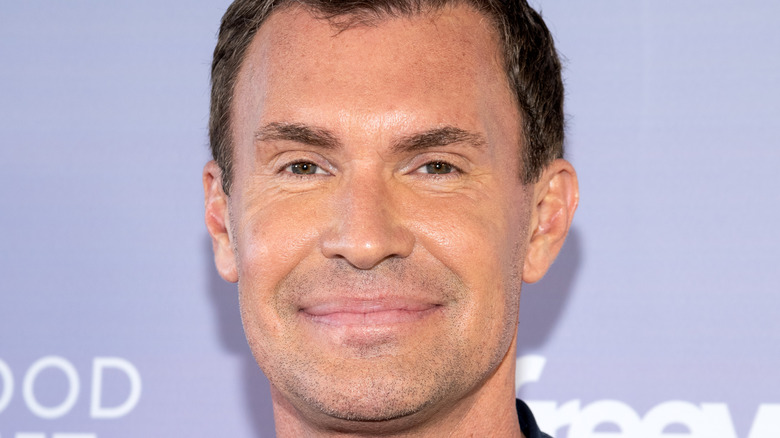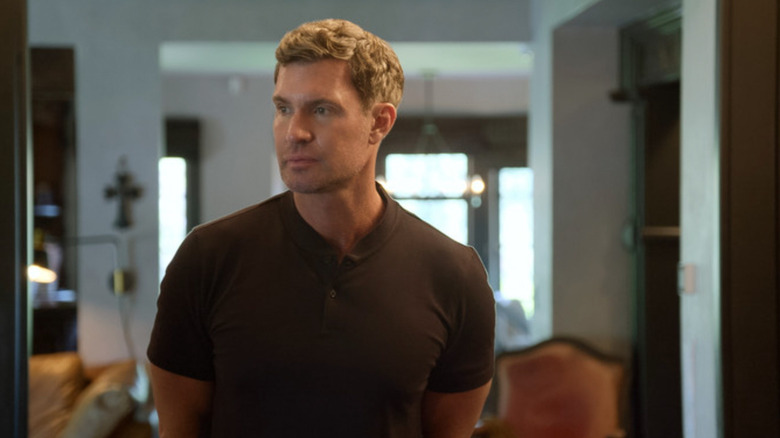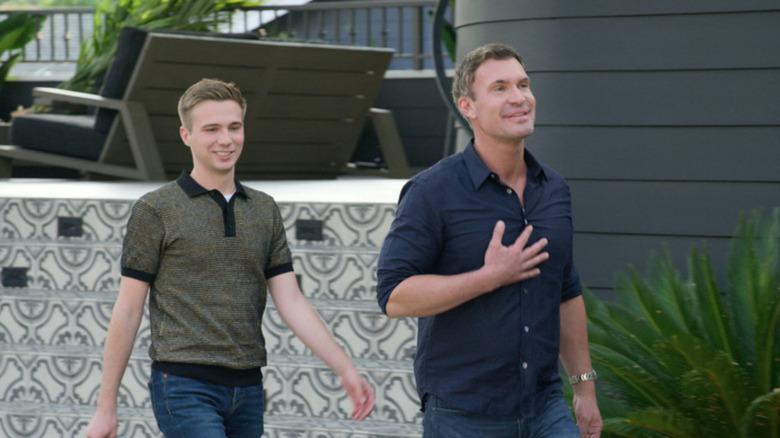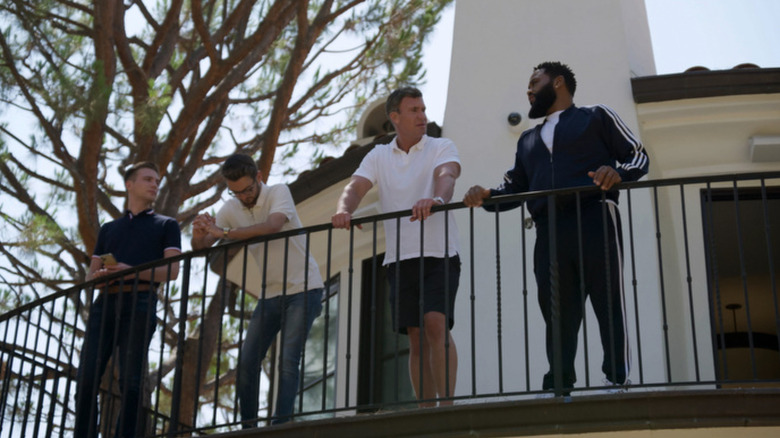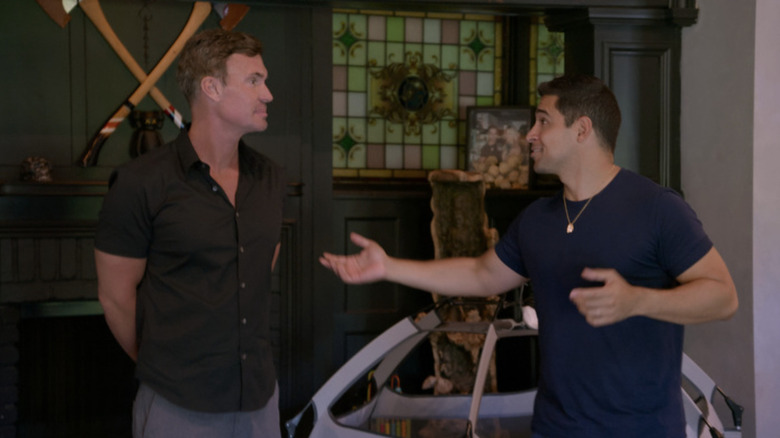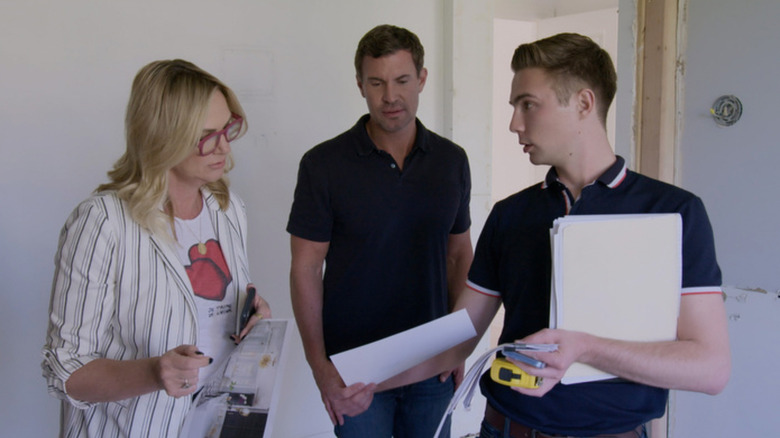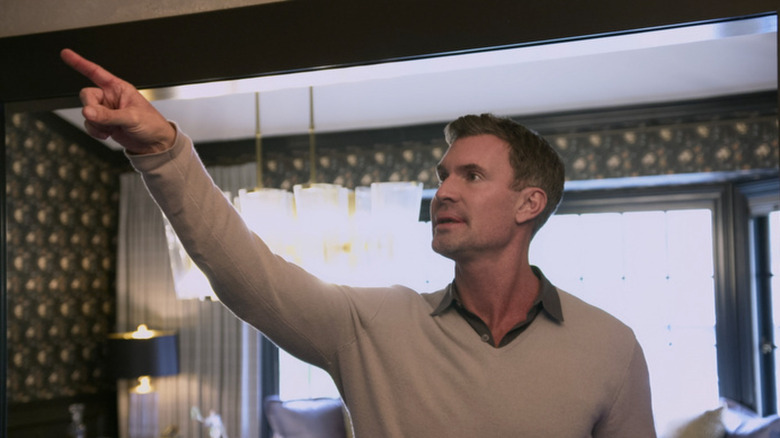Hollywood Houselift's Jeff Lewis On The New Show And Pandemic Lessons - Exclusive Interview
If you raise one — or both — hands when we ask if you're a house improvement show guru, then chances are Jeff Lewis has been on your radar for a while. The mind behind hit shows such as "Flipping Out" and "Interior Therapy with Jeff Lewis," Lewis has been a staple on the interior design scene and continues to challenge himself with new, exciting projects to this day.
We know what you might be thinking when we mention home design shows and networking of that kind — so many of the shows follow a similar format. A couple or family introduces themselves, offers a wishlist and a budget, and then leaves the design and all the hard work to the likes of Lewis. After a while, the format starts to feel a little dull, but we're not in that environment; these days, we're in Lewis' territory.
Taking to Amazon FreeVee with the new knockout show, "Hollywood Houselift," Lewis is back and is working with some of the biggest names in the entertainment industry to make dream homes a reality. Following his crew and the ups and downs of the business, Lewis' new foray on screen boasts amazing properties, insane budgets, and creative processes, and it gives a bit of insight into the on-camera designer and the personal efforts that go into such work. Amid the show's streaming on the Amazon platform, we sat down with Lewis for an exclusive interview, which veered from "Hollywood Houselift" to the pandemic to a rather simple question: "Are you happy?"
How did Hollywood Houselift get off the ground?
I want to get a sense of your background and how you took "Flipping Out" and "Interior Therapy," with all of this experience under your belt, and dove into this new project. I wanted to start, however, with how this show came to fruition. Take me back to those early days, that pitch process, that approval process, and what that looked like.
Bravo let me know by the end of 2019 [that "Flipping Out" would not be picked up] for Season 12. I immediately went to Netflix. I negotiated and worked with Netflix for six months, [but] couldn't really find the right show, right deal. By my choice, we left Netflix, and went to Amazon. Immediately, on day one, I knew. I walked in like, "This is my home, I love these executives. We're all on the same page." [They're] very creative people, and the development deal happened immediately.
We started working together, and we were flushing out shows. [In the] beginning of 2020, [there was the] pandemic. Everything is delayed a year. We honed in on what the show looked like, and then we started shooting in '21 to air in '22. The show that we had discussed in the beginning, it morphed into something else when we were shooting it. It was supposed to be a more loosely formatted, more produced show. It wasn't. It was really more of a docu-soap, but with celebrities.
We brought in the showrunner who did "Flipping Out," so he, loosey goosey, turned on the camera in the morning and turned it off at night. That's how we did it. There was no, "Okay, Ashley. You say this and Jeff's going to say that," it was nothing like that. It was like a documentary, which is what I love, because I'm not an actor and it would be forced and weird. They let it go, and it ended up being a little bit more of my personal life than I thought.
I wasn't expecting to be in the house at all. I wasn't expecting to really film any of my employees or anything like that. It organically did turn into that, about 25% my house, 75% celebrity's houses. "Flipping Out" was reversed. It was like 75/25. The [new] show found its legs. It took a minute, because we have all this raw footage. We're trying to figure out, "What does the show look like?"
Jeff Lewis has become more protective of his privacy over time
How do you feel about aspects of your personal life coming to the camera, in this new sense? What was that experience like for you?
Honestly, I feel a little more protective over my life now. My kid ... and also because I'm in a different place in my life, there's less daily chaos and drama. It might not be as interesting now as it was then. We mostly subscribe to the celebrity's drama and their personal lives.
You have such a solid team, [with] Megan [Weaver], Tyler [Meyerkorth], your assistant Shane [Douglas]... Walk me through those relationships, how they developed off camera and then what it was like transferring those dynamics to the screen.
Megan and I have worked together for at least 10 years. Tyler and I have worked together for at least five years, and Shane and I have worked together for two years, so it made sense. Sometimes when you do these shows, they will hire you a production coordinator and all of these different roles ... I'm like, "I want my people." I need people that [understand].
Tyler understands [what I need]: "Hey, I need cabinet pulls for the kitchen. I want polished brass. I want this," whatever. He knows exactly where to go, exactly what I like, the styles I like, it made sense. It was much more efficient to bring in my own employees, which then made it more authentic, because these people really do work for me. That's why I feel like it made more sense to make it more of a documentary than a produced show.
Jeff Lewis dishes about the show's development and changes over time
[Lewis on the show's initial format]
Oh, the other thing that came out of it is that, originally, they were talking about, "Oh, we meet a celebrity and we say goodbye to them in that episode."
The way we shot it, Fortune Feimster is in four episodes, Anthony Anderson is probably in the whole series. We have eight celebrities, we filmed it over 10 episodes, and sometimes it takes three episodes to finish someone's house, and then say goodbye. What I like about it is you don't know how it's going to end. How is this episode going to end? Is their house finished? All of a sudden, you meet somebody new. People come in, people come out — it's not this formulaic, expected result.
It sounds like it was such an organic way that it came about and that it developed. In what ways are you glad that the show took on a life of its own?
Frankly, I wasn't totally on board with how the produced, formulaic design show was structure. I didn't like it. It actually turned into a show that I could really get behind and be proud of. I wanted it different. I wanted this to stand out from all these HGTV shows where ... you're dealing with, we have very big budgets, we have beautiful remodels and I don't know too many people that have those ... To be honest with you, we spent $165,000 on Melissa's [Rivers] bathroom. One bathroom, $165,000. I don't see too many shows ... I wasn't wasteful. We had really good, expensive taste.
Well, $165,000 that could be the budget for an entire reno on another show.
But it was an $8 million house. You buy an $8 million house, you don't spend $20 grand on a bathroom, you got to spend. What we did made sense for that house, that neighborhood.
What was it like for Jeff Lewis to work with such high profile clients?
Let's talk a little bit more about the clients that you got to work with, and the details of their homes. As you said, Anthony Anderson, Melissa Rivers, Wilmer Valderrama, these are big names. I'd love to know what some of those behind-the-scenes details were like. What it was like working with them as clients, and how did that transfer to the camera as well? [Are there] any designs that stand out to you.
It was a little bit of a learning curve. This is how I work. I'm a little bit of a bull in a china shop. I come in hot and strong and this is what we're going to do. I feel like some people have to get used to that. I'm extremely direct. It's a little off putting at first, but it serves me and works for me.
Anthony Anderson came from a situation where he had a contractor, he had what was supposed to be a one-year budget, a one-year timeframe for the remodel, [and it had] been three. He was very frustrated with contractors, subcontractors, bad experiences, and didn't really have too much trust in people. When I came in, initially he's like, "Well, I don't know. I don't..." I came through for him, and as I came through, he trusted me.
Now, he's hired me. I still work for him, but I had to prove myself to him. With a lot of these celebrities, they didn't know what to expect, and then I work directly with them. It's not like one of these situations [where they say], "We want this," [and it turns into,] "Okay, come back in four months." They were with me. They were picking things out. We were shopping together. We were working together. There were no surprises.
With such an extensive remodel, such an extensive budget, I would imagine that they would want to walk that process with you.
Yes, and then some people even came to the table with more money, to do more work.
I was thinking about what it would be like to work with such high-profile clients. I'm sure that they all, as you said, have such a specific way of working, and such a specific design style as well. I'd love for you to speak to that, the actual design element that was in your work.
The celebrities that we worked with are actors and musicians, so these are creative people. It's very different. I've worked for attorneys, and doctors, and when you're working with these actors, and these musicians, they're very creative, they're artists. I found a lot of them much more involved and invested in the renovations and the remodels than my non-celebrity clients.
That was a fun process, because it was more collaborative than what I'm used to. I've learned things. They would point to things that I wouldn't normally pick for myself and I thought, "Okay, let's see if that would work," and it did. It really was a fun, creative process for me. When you have eight celebrities, I thought for sure, I'm going to fight with some people. I'm sure there's going to be an unhappy ending... but ironically, surprisingly, we all got along pretty well. Did we have some disagreements? Yes, but everyone, in the end, was happy.
Jeff Lewis reflects on the pandemic and coming back to the screen and housing market
Coming out of the pandemic. I was able to read a great interview that you did about speaking to fatherhood, what this pandemic experience has been like for you. I'd like to know what it was like to come back to the screen, come back to the housing market, after such an unpredictable two years.
A long time ago in 2007, when the [real estate] market crashed ... I was all in when the market crashed. I had one source of income, and when I came out of that, I wasn't unscathed, but I came out alive, and with my credit and with some money, I told myself I was going to develop multiple streams of income. Thank God I did that, because, during the pandemic, we were home for a year, [and] two of my three sources of income dried up.
I couldn't get in people's homes to remodel. My income went down for the year of 2020. My income went down 66%. I still had income, but I felt it. Everybody went through something, but I choose to focus on the positive. The positive was, I was home with my kid for a year after working, not spending as much time with her as I wanted.
Also, by being home and sending everyone home, I was able to realize what employees were of real value to me, [and] what employees can we let go of. By downsizing and restructuring and streamlining the business, I was able to cut my expenses, and now I don't have to chase business the way that I did before.
In a lot of ways, the pandemic served me. There was a lot of terrible sickness, and death, and financial ruin, and all of that. I was very fortunate that I could continue to pay my bills, and I was very fortunate that I had a very nice place to reside during the pandemic. I felt like that's when I truly bonded with my child, who at that point was three. Now we have a very nice, close, connected relationship. I'm committed to keeping it that way.
You can't put a price on how valuable that is.
I still have to make money, but I won't work the way that I did. I also had health problems because all I was doing was work and stress, and so I changed everything.
The designer reflects on finding the silver lining and the takeaway from Hollywood Houselift
I'm so glad that you found those silver linings. So many of us have been trying to focus on the positive amid the pandemic chaos and the fallout of it, so that's brilliant that you were able to do that.
And this isn't being dramatic and this is not exaggerating — for the first time in a very long time, I'm happy.
Happiness is, in my opinion, criminally underrated.
You're absolutely right.
I'm so excited to sink my teeth into this show. With that in mind, what are you hoping the audiences will take away from "Hollywood Houselift?"
I hope this is a new, fresh take on the home-remodel genre. Bringing in the celebrities is something not a lot of people have done successfully. What do I want? I'd like people to respond well to this, and get a Season 2. That's what I really want, to keep going with this. I'd like to bring you eight more celebrities next season and eight more after that. Creatively, I love what I'm doing. I want to do this until it doesn't make me happy. Right now, it makes me happy.
I was thinking that this morning, by the way — I'm not going to do anything anymore that doesn't make me happy. This makes me happy, and I would love to continue doing this. It's really up to you guys, at this point. If you respond well, hopefully you respond well, and the network responds and they pick it up.
Absolutely. As I said, if you find something that makes you happy, by all means, you have to jump in with both feet.
Yep. I'm in the second half of my life, let's be honest. When I turned 50, I was like, "How do I want to live out this, the rest of my life?" A lot of people that have turned 50, people that around my age group that have done that, it's a very similar response and reaction. You really start thinking about your own mortality.
"Hollywood Houselift" premiered on Amazon FreeVee on June 10, and will drop new episodes every Friday through July 29.
This interview has been edited for clarity.
